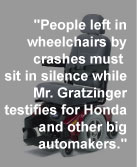|
|
[http://tlpj.org/left_nav_interior.htm]
|
TLPJ Challenges Sweeping Court Order That Seals Decision Sanctioning Expert Witness and Honda for Evidence Tampering Honda and Other Major Auto Makers Now Relying on Extraordinary Secrecy Order to Bar Questioning of Same Expert in Other Crash Cases
The sanctions decision, issued
in the middle of trial, reportedly held the automaker liable
after the court found that Honda’s expert witness, Robert
Gratzinger, had deliberately tampered with key evidence in the
case. The sanctions decision was vacated and sealed from public
view after the case settled. On September 20, 2005,
TLPJ filed motions on behalf of a national auto safety group
and attorneys representing car crash victims in Tennessee and
Mississippi, who are seeking to end the secrecy blanketing the
decision.
Honda and other auto companies,
such as Ford, Toyota, and Mazda, are still hiring Gratzinger as
an expert witness and are using the exceptional order to prevent
crash victims in other cases nationwide from disclosing – or
even questioning him about – what happened.
“This extraordinary secrecy
order is being used to stop crash victims from questioning Mr.
Gratzinger and challenging his credibility,” said TLPJ Staff
Attorney Rebecca E. Epstein. “People left in wheelchairs by
crashes must sit in silence while Mr. Gratzinger testifies for
Honda and other big automakers. They’re not even allowed to tell
the jury that a judge in a similar case found that this man
destroyed critical evidence, even though the court’s key
findings have already been reported online and in a daily
newspaper.”
The now-sealed sanctions
decision, issued on October 3, 2002, was originally public and
the subject of an October 11, 2002 article published in the
Sacramento Bee. The
newspaper reported that the Placer County Superior Court in
Auburn, California, found that Honda expert witness Gratzinger
“intentionally” used a rag on September 4, 2002, to
“obliterate” crucial marks on the safety belt of the Honda
Civic that could have shown, contrary to Honda’s assertions,
that Davis was wearing her seat belt when the car crashed. The
court also found that an attorney for Honda “knowingly
prevented” the rag from being preserved. It ruled that, as a
sanction, Honda would be held liable for the crash. The jury
would decide only the amount that Honda paid for Davis’s
injuries.
But the sanctions decision,
called “a stunning 36-page decision” by the
Bee, is shrouded in
an unusually high level of court-imposed secrecy. One week after
it was issued, the case settled and, on October 11, 2002,
apparently as part of the settlement, the court entered a
secrecy order that sealed and voided the sanctions decision. The
extraordinary sealing order also prohibits all publication of
the sanctions decision, requires copies to be destroyed, and
prohibits anyone from testifying about the sanctions decision –
or even mentioning it – in any legal proceeding nationwide. As a
result, even though Gratzinger continues to serve as an expert
witness for automakers in crash cases around the country, some
courts have forbidden auto accident victims from asking him
about the sanctions decision and his conduct in
Davis.
TLPJ is challenging the secrecy
order on behalf of the
Center for Auto Safety, a national consumer group that works
to improve automobile safety, attorney Patrick M. Ardis of
Wolff Ardis, P.C., in
Memphis, Tennessee, and attorney Lee T. Griffin of
Pajcic & Pajcic in
Jacksonville, Florida.
Ardis represents Bettye Maxwell
in Maxwell v. Ford Motor
Company, a lawsuit filed on behalf of Maxwell’s
husband, who was killed in an August 2001 crash in a Ford F150
pickup truck in DeSoto County, Mississippi. Gratzinger
was called as an expert witness in the
Maxwell case, but,
because of the secrecy order, the presiding judge prevented
Maxwell’s lawyers, including Ardis, from questioning Gratzinger
about his conduct in the
Davis case. Griffin represents Todd Irish in
Irish v. Ford Motor Company,
a lawsuit filed after Irish was rendered a paraplegic as a
result of a November 2002 accident involving his Ford pickup
truck. Gratzinger has been named an expert witness in the
Irish case as well.
TLPJ Cooperating Counsel Dina
Micheletti of
Fazio | Micheletti
in Pleasanton, California, said, “This case
illustrates why it is so important to protect the public’s First
Amendment right of access to court records. In this situation,
we believe the trial court was motivated by the laudable goal of
ensuring that a severely injured teenager was compensated for
her injuries. Regrettably, however, defense counsel throughout
the country are using the court's Sealing Order to preclude
other severely injured crash victims from questioning Mr.
Gratzinger about what the court found was intentional
destruction of evidence. That injustice needs to be stopped.”
TLPJ’s legal team also includes
Jeffrey Fazio of Fazio & Micheletti, TLPJ Executive Director
Arthur H. Bryant, and TLPJ’s Brayton-Baron Fellow Leslie A.
Bailey. The challenge is part of TLPJ’s Project ACCESS, a
15-year-old project against excessive court secrecy, and the
group’s new Access to Justice Campaign, a nationwide initiative
to keep America’s courthouse doors open to all. The motion
challenging the Davis
secrecy order can be viewed on TLPJ’s web site at
www.tlpj.org. |
